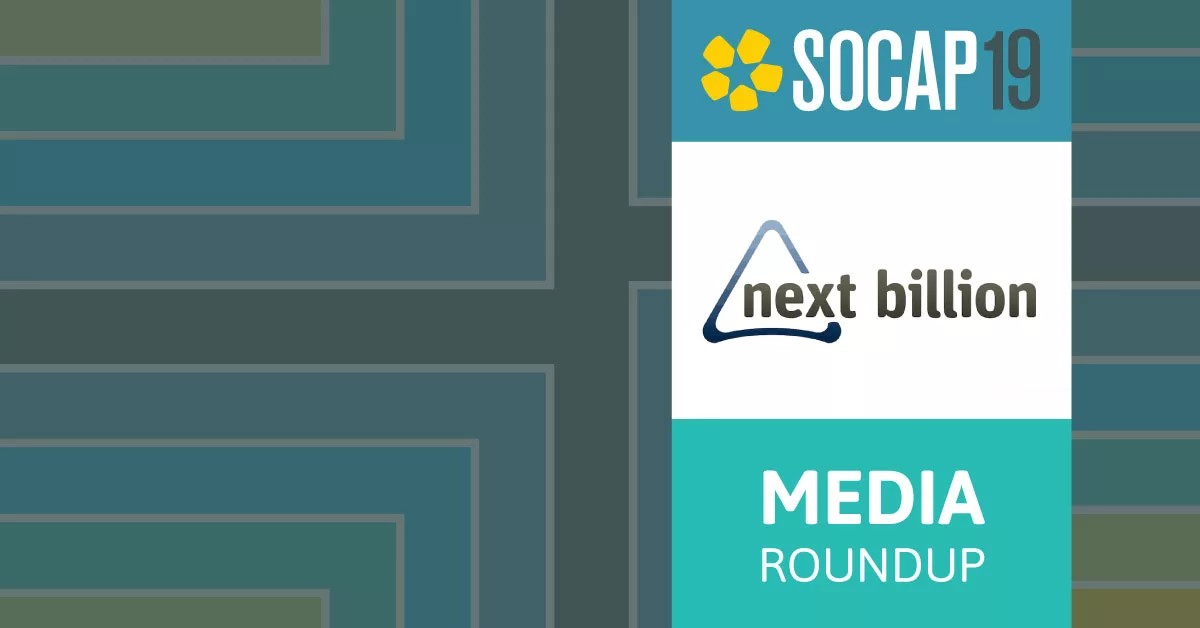To help you prepare for the conversations that will be taking place at SOCAP19 we asked our media partners to curate a selection of stories they have published that focus on one of today’s most important topics in the impact space. This week’s suggested reading comes from NextBillion.Impact investing has gotten an increasing amount of mostly positive mainstream media coverage over the years. But early in 2019 the sector experienced the downside of that attention.
After Bill McGlashan at TPG’s multi-billion dollar Rise Fund was charged in a fraudulent scheme to get his son into an elite university as part of the “Varsity Blues” college admissions scandal, impact investing was caught in a media firestorm the likes of which it had never seen. A lot of ink was spilled discussing the ramifications of this episode for the sector, but for our money, the sharpest analysis came from Blue Haven Initiative Managing Director Lauren Cochran: Her NextBillion post pulled no punches – but kept the scandal firmly in perspective. (It also happens to be our most-read article of the year so far.)
While not all of our writers touched as hot a stove as Cochran did, 2019 already feels like an unusually eventful year in impact-focused business. As an open forum for guest-written articles from leaders, practitioners and researchers working in the sector, NextBillion offers a front-row view to trends and debates that are bubbling up just below the surface. Our most-read articles of the year so far address some of the key events, innovations and ongoing discussions that are shaping the sector’s future – as showcased by the samples below.
An Emerging Business Trend
Each year, NextBillion’s editors highlight a few emerging topics in development-focused enterprise that we cover in depth via year-long series. This year, one of those series topics has garnered a particularly enthusiastic response. Our series on New Frontiers in Renewable Energy has not only generated significant interest among guest writers (18 posts and counting), it has sparked major interest among readers: Six of those posts are among our most-read articles of the year. These articles have:
- Expressed both optimism and concern about PAYGO financing in off-grid solar
- Explored research on how the mini-grid industry can fulfill its potential
- Asked why solar water pumps haven’t scaled
- Imagined how an off-grid home might operate in the coming decade
We view the surge of posts and clicks for this series (not to mention the burgeoning interest among investors) as a key sign that the sector is moving toward the vanguard of emerging markets business models. Expect to hear a lot more about off-grid energy in the coming year, as the industry deals with the opportunities and risks its success will bring.
A New Focus in an Old Debate
Though other industries and innovations are claiming an increasing share of the global development spotlight, financial inclusion continues to spark both substantial interest – and considerable disagreement – among our readers. Case in point: three articles we published in close succession in February. One, from World Bank economist Leora Klapper, asserted that financial inclusion is essential to achieving the SDGs. A second, from Daryl Collins at BFA and Liz Larson at UNCDF, offered a measurement framework that could help substantiate that bold claim. And a third, from researchers Phil Mader and Maren Duvendack, portrayed Klapper’s argument as flatly incorrect – “not evidence-based policy-making, but policy-based evidence-making.” The juxtaposition of these competing viewpoints and analysis made for a compelling discussion – the kind of open, informed debate that we love to feature on NextBillion.
Questioning Common Assumptions
Speaking of debate, several of our top posts of the year have pushed back on established narratives in provocative ways, sometimes sparking push-back of their own. For instance, our guest writers have argued that:
- Behavioral science needs to get over its fixation on small-scale “nudges” if it hopes to make a real impact
- Kenya’s much-lauded, digitally driven economic system isn’t as inclusive as many people think
- The notorious “missing middle” challenge in SME finance is not driven by businesses, but rather by funders’ (mis)understanding of risk
- There’s a troubling downside to scaling impact, as more measurably impactful social interventions are more likely to be penalized for negative side effects
Whether you agree or disagree with their arguments, these analysts are raising issues that are worthy of discussion, and we’re happy to give them (and you!) a platform to make their case. If you’re interested in contributing a guest article or op-ed related to the challenges and opportunities of doing business in emerging markets, drop us an email. We’re currently assessing potential topics for our special series in 2020, so if you have any suggestions on trends we should be watching, or technologies or enterprises we should be covering, let us know.
We’re looking forward to seeing what other topics our guest writers tackle in the remaining months of 2019 – and beyond. Feel free to reach out to our editors any time. And if you’d like to talk in person at SOCAP, contact us on Pathable – as usual, we’ll have a presence at the conference this year, and we’d be delighted to meet you.


